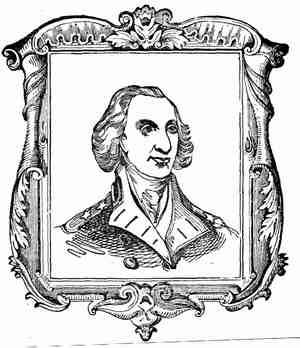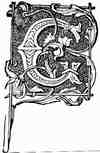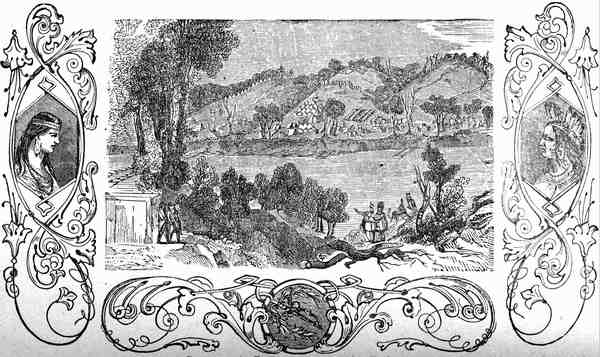Thrilling Incidents In American History
• Preface
Revolutionary War
• Opening Of The Revolution
• The Boston Massacre
• Affair of the Sloop Liberty
• Affair of the Gaspee
• The Tea Riot
• The Boston Port Bill
• The First Continental Congress-Consequent Parliamentary proceedings
• Organization of the Minute-Men
• Patrick Henry-Second Provincial Congress-First Military Enterprise
• Battles of Lexington and Concord
• Battle of Bunker's Hill
• Capture of Ticonderoga
• Second Continental Congress-Washington's Appointment
• Siege of Boston
• Incidents at the Evacuation of Boston
• Burning of Falmouth
• Arnold's Expedition to Quebec
• Siege of Quebec, and Death of Montgomery
• Scenes at Quebec during the Siege
• Expedition against Charleston
• The Declaration of Independence
• The Battle of Long Island
• Washington's Retreat through New Jersey-Capture of General Lee
• Battle of Trenton
• Battle of Princeton
• Capture of General Prescott
• Battle of Brandywine
• Battle of Germantown
• Battle of Red-Bank
• Attack on Fort Mifflin-Retirement of the Army to Valley Forge
• Battle of Bennington
• Murder of Miss M'Crea
• Battle of Stillwater
• Battle of Bemis' Heights, and Retreat of Burgoyne
• Capture of Forts Clinton and Montgomery
• Surrender of Burgoyne
• The Treaty with France
• Attack on Savannah, and Death of Pulaski
• Storming of Stony Point
• General Sullivan's Campaign against the Mohawks
• Tarleton's Quarters
• Battle of Camden, and Death of De Kalb
• Arnold's Treason
• The Loss of the Randolph
• The British Prison-Ships
• Capture of the Serapis
• Putnam's Feat at Horseneck
• Battle of Eutaw Springs
• Wayne's Charge at Green Spring
• Capture of the General Monk
• The Mutinies
• Battle of the Cowpens
• Capture of New London
• Massacre of Wyoming
• Surrender of Cornwallis
War With France
• Capture of L'Insurgente
• The Constellation and Vengeance
War With Tripoli
• Burning of the Philadelphia
• Bombardment of Tripoli
• Loss of the Intrepid
• Expedition of General Eaton
Second War With England
• Battle of Tippecanoe
• Capture of the Guerriere
• Tragical Affair of an Indian Chief
• Battle and Massacre at the River Raisin
• Captain Holmes's Expedition
• Capture of the Caledonia and Detroit
• The Wasp and Frolic
• Gallant Conduct of Lieutenant Allen at the Capture of the Macedonian
• Capture and Destruction of the Java
• Siege of Fort Meigs
• Capture of York, and Death of General Pike
• Defence of Sackett's Harbour
• Defence of Fort Stephenson
• Battle of Lake Erie
• Battle of the Thames
• Gallant Action of Commodore Chauncey under the guns of Kingston Citadel
• The Sacking of Hampton
• Capture of the Peacock
• Massacre at Fort Mimms
• Surrender of Weatherford
• Battle of Niagara
• BattIe of New Orleans
War With Mexico
• Battle of Palo Alto
• Battle of Resaca de la Palma
• Capture of Monterey
• Battle in the Streets of Monterey
• Thrilling Scenes in the Battle of Buena Vista
• Bombardment of Vera Cruz
• Battle of Cerro Gordo
• Battles of Contreras and Churubusco
• Storming of Chapultepec


General Schuyler.
BATTLE OF STILLWATER.
 ENERAL GATES, who succeeded
General Schuyler in the
command of the army, having
been reinforced by all the fresh
continental troops destined for
the northern department, and
also by considerable bodies of
militia, left the strong position which General
Schuyler had taken at the confluence of the
Mohawk and Hudson, eight miles above Albany,
proceeded sixteen miles up the river towards the
ENERAL GATES, who succeeded
General Schuyler in the
command of the army, having
been reinforced by all the fresh
continental troops destined for
the northern department, and
also by considerable bodies of
militia, left the strong position which General
Schuyler had taken at the confluence of the
Mohawk and Hudson, eight miles above Albany,
proceeded sixteen miles up the river towards the

Burgoyne's Encampment on the Hudson
enemy, and formed a strong camp near Stillwater. The two armies were only about twelve miles distant from each other; but the bridges between them were broken down, the roads were bad, and the country was covered with woods; consequently the progress of the British army, encumbered by its fine train of artillery and numerous wagons, was slow, and it was attended by some skirmishing.
On the evening of the 17th of September, 1777, General Burgoyne encamped within four miles of the American army, and spent the next day in repairing the bridges between the two camps, which he accomplished with some loss. About mid-day, on the 19th of September, he put himself at the head of the right wing of his army, and advanced through the woods towards the left of the American camp: General Frazer and Colonel Brehman, with the grenadiers and light infantry, covered his right flank; and the Indians, loyalists, and Canadians proceeded in front. The left wing and artillery, commanded by Generals Philips and Reidesel, proceeded along the great road near the river.
The nature of the ground prevented the contending armies from observing the movements of each other; but General Gates, whose scouts were in constant activity, was soon informed of the advance of the British army. He detached Colonel Morgan, a bold and active partisan, with his riflemen, to observe the motions and impede the progress of the enemy. Morgan soon met the advanced parties in front of the British right wing, and drove them back. General Burgoyne supported them by a strong detachment; and, after a severe conflict, Morgan, in his turn, was compelled to give way. But General Gates reinforced him, and the engagement became more general. The Americans attempted to turn the right flank of the British army, with the view of attacking it in the rear; but being opposed by Frazer and Brehman, they made a rapid movement, and commenced a furious attack on the left of the British right wing. The combatants were reinforced; and between three and four in the afternoon, General Arnold, with nine continental regiments and Morgan's riflemen, was closely engaged with the whole right wing of the British army. Both parties fought with the most determined courage; and the battle ended only with the day. When it became dark, the Americans withdrew to their camp; and the royal troops lay all night on their arms on the field of battle. On hearing the firing at the beginning of the engagement, General Philips with some artillery forced his way through the woods, and rendered essential service.
In this battle, in which each party had nearly three thousand men actually engaged, the British lost upwards of five hundred in killed and wounded, and the Americans about four hundred men. Night separated the combatants: each side claimed the victory, and each believed that with a part only of its own force, it had beaten the whole of the hostile army. But although neither army was defeated, it was evident who had gained the advantage; General Burgoyne had failed in the attempt to dislodge his enemy, and his progress was arrested. His communication with the lakes was cut off, and his resources were daily failing; while the Americans had the same opportunities of gaining supplies as before, and their strength was still increasing by the arrival of fresh troops. In such circumstances, to fight without a decisive victory was to the British nearly equivalent to a defeat; and to fight without being beaten was to the Americans productive of many of the consequences of victory.
Accordingly, the news of the battle was received with joy and exultation throughout the United States, and the ruin of the invading army was confidently anticipated. The militia were encouraged to take the field, and assist in consummating the work so auspiciously begun. At that time the army under the command of General Gates did not much exceed seven thousand men; but it was soon considerably increased.
